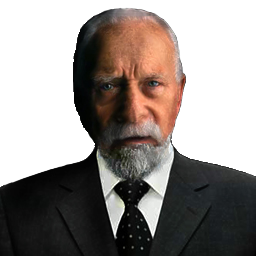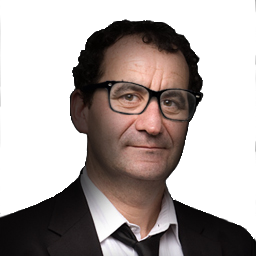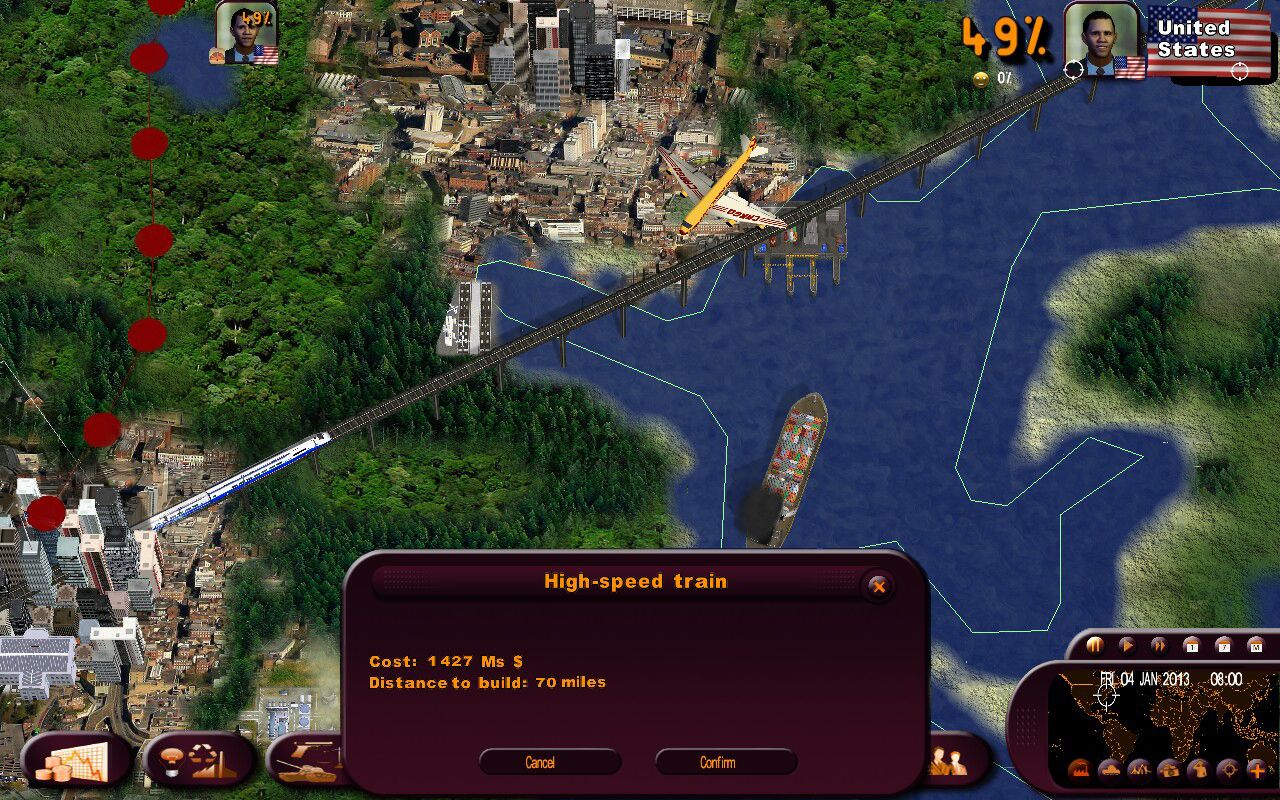
Newsletter November 2013
Greetings to all !
In this first newsletter of Masters of the World, our topical feature is dedicated to construction projects related to transportation. Also, please note the link to a survey that will enable us to take into account your wishes in defining the new functionalities of the future Geo-Political Simulator 4 (to be released in late 2014).
We would also like to remind you that you can consult our previous twelve newsletters regarding Geo-Political Simulator versions 1 and 2. The respective tips and topical features remain valid for Masters of the World.
Here is the link to receive them: link.
Happy reading !
CONTENTS
FEATURES
GPS4 and Survey
Our teams have started working on Geo-Political Simulator 4, which will likely be released in the second half of 2014. As part of these developments, we invite you to participate in a survey, open until December 21 2013, so we can collect your opinions and suggestions and focus our work accordingly.
Link to the survey on the game’s website: Survey GPS4
Crowdfunding and Survey
At Eversim, we are interested in participatory systems of funding (or crowdfunding) and we would like to know the views from our community about the subject.
Link to the survey: Survey crowdfunding
Le crowdfunding est une méthode de production qui fait appel aux internautes pour préfinancer le développement d'un projet de création en échange de contreparties et prestations exclusives liées au produit final.
GPS3 in Japanese
A Japanese version of Masters of the World will be released in late November. It will be available on our website and also in Japanese stores via our partner Overland
OUR COMMUNITY
Results for the Contest for Best Rulers of Nation Mods:

The three winners are :
- Best scenario ($300.00): modafoka73 « Le futur proche » (France)
-Most original mod ($100.00): URF « URF » (USA)
-Most popular mod ($100.00): Hugoj64 « La plus grande france »(France)
TIPS FROM PRESIDENT FIDEL WASHINGSKY

"For me, it's simple. When I am lacking a bit of funding for my projects, I know where I can get it: through taxation, by increasing the taxes that people find more acceptable and which will not cause an uproar in Parliament, or more specifically, those taxes related to deforestation, gambling, pets, or yet firearms. But I admit that these are all small potatoes compared to another tax that even at a very low level yields a treasure of benefits, is rather well received concerning public opinion, and, moreover, remains fairly easy to be accepted by Parliament. Obviously, I am referring to taxing financial transactions!"
PROFESSOR DEMONTFORT'S RESPONSE

What are the consequences for the player regarding transport infrastructure construction and its respective geographic placement ?
There are three types of transport infrastructure construction that you can place on the map: high-speed trains, port facilities (civil and petroleum), and airports (medium- and high-traffic).
At the start of the game, about 150 ports, 150 airports, and almost all high-speed railways are placed on the world map in the most important places.
Costs vary depending on the standard of living of each country. For a great Western power, at the beginning of the game, they total roughly:
- -$20 million per km of TGV
- -$650 million for a medium-traffic airport
- -$5.2 billion for a high-traffic airport
- -$4 billion for an oil port
- -$6.5 billion for a civil harbor
These costs are spread over five years. The annual payment is added to the expenses of the state budget in the position of the Ministry of Transport and it increases the budget deficit accordingly.

- These new infrastructure elements will augment the revenues of certain economic sectors of services to which they correspond, namely:
- rail transport for TGV trains
- air transport for airports
- naval transport for ports
- tourism for airports and also a bit for high speed trains
They will also impact the four key variables of the game: transport networks promoting tourism, goods transportation networks, the conditions for circulation of people (public transport, automobile transport), and the development of the region (or regions) concerned by these infrastructure elements. It is the impacts of these variables that will cause the changes in popularity for the player.
We will now detail them by infrastructure element.
Transport modes promoting tourism:
New airport: its impact on transport modes promoting tourism will depend on the result of the following operation: the tourism revenues divided by the assessed value of the existing transport means promoting tourism (*).
The program will then compare this result with the observed global average (calculated for all countries in the world). If the result in the country is higher than the world average, then the new airport will be relevant in this area, otherwise it will not be so. Gains in popularity will be calculated based on the difference vis-à-vis the world average.
We can summarize this in another way: the player will get popularity points if their country requires new infrastructure, taking into account the existing infrastructure in relation to the country's tourism attractions. The more a country has a major tourism activity with few dedicated transport means, the more the player will get popularity points. Conversely, if a country has a small tourism activity and/or too many transport means already dedicated to tourism, the player will not benefit from a popularity bonus in this area.
(*) The assessment of the tourism transport means takes into account airports, high-speed railways, other railways, and highways, using different coefficients. Note that this assessment is upgraded according to the size of the country (its area and population).
New high-speed railway: same calculation as for airports, except that popularity gains are lower.
Freight:
New airport: its impact on transport of goods will depend on the result of the following operation: total freight traffic (import and export) divided by the assessed value of the means for transporting goods (**). The program will then compare this result with the observed global average (calculated for all countries in the world). If the result in the country is higher than the world average, then the new airport will be relevant in this area, otherwise it will not. Gains in popularity will be calculated based on the difference vis-à-vis the world average.
(**) The assessment of the means for transporting goods takes into account, using different coefficients: airports, the budget allocated to air transport, ports, railways, and river transport, and it is upgraded according to the size of the country.
New port: same calculation as for a new airport, except that popularity gains are higher.
Conditions for circulation of people:
New high-speed railway: to calculate its impact, the program will evaluate current circulation conditions in the country. If they are already good, the player will not win popularity points. On the other hand, if they are insufficient, the player will be awarded points. The assessment of conditions of circulation takes into account, using different coefficients: road networks (this data does not change throughout the game) and highway networks, subways and the budget for public transport, the budget for road maintenance, bike paths, rail networks (high speed or other), river transport, airports, and the traffic police. This assessment is certainly upgraded according to the size of the country (area, population, and number of major cities).
Development of the region concerned by the infrastructure.
This assessment is performed only if there is more than one region in the country:
New airport: if there is already another airport nearby (less than 200 km), then a negative smiley "Waste of public money" will be sent. Otherwise, the program will compare all regions of the country vis-à-vis their existing airports (total number and traffic volume) and their population, and it will determine in this way a ranking of regions according to their needs. According to the ranking of the region selected by the player, the popularity points obtained will be higher or lower. This can even lead to negative points ("Waste of public money").
New port: same calculation as for the airport, except that the test for the minimum distance of proximity is calculated based on the distance to the coast (< 300 km).
New high-speed railway: this assessment is only performed ??if there are more than three cities on that country's map. The program will calculate the needs of each city in the country based on their population and their existing railways, and will compare this with the new railway traced by the player. According to the results, the player will win more or less popularity points, or may lose some points if they have made really bad choices.
TIPS
If the mode for managing your troops on the map is "Active Multi-Order," allowing you to chain orders to selected units, and you wish to change to "Inactive Multi-Order (or single command)," by default: you can do this when giving the first order, by clicking on the last "Multi-Order Mode" icon on the icon toolbar of the selected units (the icon will change from white to orange), or by pressing the
To stop a multi-order that is underway, you can select the last icon on the icon toolbar of the selected units, or press the
DID YOU KNOW?
Fifteen years from now, when its construction is completed, the largest airport in the world will be that of Dubai, with 160 million passengers per year. Inaugurated in 2010 for cargo only, it has now been a few weeks since it was opened to passenger traffic. Plans exist to eventually append a huge commercial and tourist area, the Dubai World Central, that is 140 km long!
NEXT ELECTIONS
There are relatively few upcoming elections in the next few months. They will be mostly confined to Africa and the Americas. Here they are in detail.
First of all, in Chile: the first round is on 11/17/2013 and the second round will possibly be on 12/15 – so perhaps you already know the result. Two women will dispute the presidency, the former Socialist President and Deputy Secretary General of the United Nations (UN Women) Michelle Bachelet, great favorite of the election, and Evelyn Matthei, former Minister of Labor, running under the banner of ultra conservative parties currently in power. Voting abstention risks being high in a country where the political class has lost much credit.
In Honduras (11/24), local, legislative, and presidential elections will redefine the political map of the country. The leader of the conservative right-wing National Party, who is currently in power, will run against the wife of the former left-wing president, victim of a military coup in 2009. Current polls show candidates are neck-to-neck, and the temptations of fraud will be great, despite the presence of many observers.
In Mauritania (the first round is on 11/23, and the second round is on 12/07), the legislative elections are being boycotted by most of the opposition parties, except the Islamist party Tawassoul, considered the second force in the country, and which will therefore face the current ruling party, the Union for the Republic.
Also in West Africa, in Mali (first round on 11/24, second round on 12/15), there will be the first legislative election since the African and French military intervention against the jihadists in the northern part of the country. This election should have taken place initially in August, at the same time as the presidential elections, won by Ibrahim Boubacar Keita, a member of the center-left party, Rally for Mali.
In Turkmenistan (12/15), the elections should once again reinforce the ultra-dominant party in the country, of Soviet inspiration.
In Madagascar (12/20), the second round of the presidential election (paired with the legislative elections) will have Dr. Jean-Louis Robinson, a former minister of Marc Ravalomanana, face off the exiled former president, Hery Rajaonarimampianina, former Finance Minister of the transitional government of President Andry Rajoelina.
In Bangladesh, general elections were expected to take place normally in January, but the country is currently experiencing tensions due to strikes by the opposition, composed of the Nationalist Party and Islamist parties. They are demanding the resignation of the current Prime Minister of the country, of the Awami League party, before elections can be held.
In Costa Rica (02/02/14), electors will go to the polls to elect their president and legislature. The candidate of the NLP (National Liberation Party), the current neo-liberal ruling party, is the election favorite.
Lastly, in El Salvador (first round on 02/02, second round on 03/09), the former President Antonio Sacca (right-wing, nationalist), the mayor of the capital, San Salvador (same line as Sacca), and the current Vice President Salvador Sanchez Ceren (left-wing, communist) will confront each other in the presidential elections.
You receive this newsletter because you are a subscriber.
To unsubscribe to the newsletter, follow this link.
Rulers of Nations newsletters archives.
© Eversim 2013, All rights reserved.